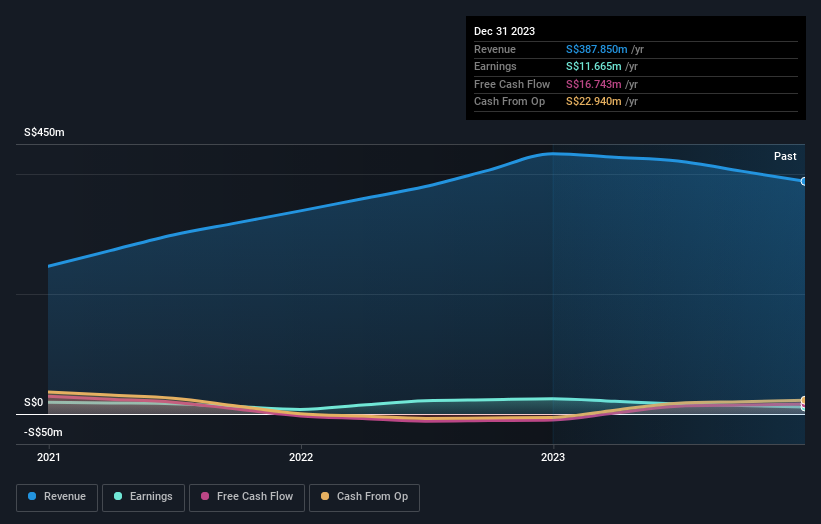Tai Sin Electric Limited (SGX:500) insiders seem bullish, own 50% and have been buying more recently
Key Insights
Insiders appear to have a vested interest in Tai Sin Electric's growth, as seen by their sizeable ownership
The top 15 shareholders own 50% of the company
Every investor in Tai Sin Electric Limited (SGX:500) should be aware of the most powerful shareholder groups. We can see that individual insiders own the lion's share in the company with 50% ownership. That is, the group stands to benefit the most if the stock rises (or lose the most if there is a downturn).
And looking at our data, we can see that insiders have bought shares recently. This could be interpreted as insiders anticipating a rise in stock prices in the near future.
In the chart below, we zoom in on the different ownership groups of Tai Sin Electric.
Check out our latest analysis for Tai Sin Electric
What Does The Lack Of Institutional Ownership Tell Us About Tai Sin Electric?
We don't tend to see institutional investors holding stock of companies that are very risky, thinly traded, or very small. Though we do sometimes see large companies without institutions on the register, it's not particularly common.
There are many reasons why a company might not have any institutions on the share registry. It may be hard for institutions to buy large amounts of shares, if liquidity (the amount of shares traded each day) is low. If the company has not needed to raise capital, institutions might lack the opportunity to build a position. Alternatively, there might be something about the company that has kept institutional investors away. Institutional investors may not find the historic growth of the business impressive, or there might be other factors at play. You can see the past revenue performance of Tai Sin Electric, for yourself, below.
Hedge funds don't have many shares in Tai Sin Electric. Looking at our data, we can see that the largest shareholder is the CEO Boon Hock Lim with 18% of shares outstanding. For context, the second largest shareholder holds about 6.8% of the shares outstanding, followed by an ownership of 5.0% by the third-largest shareholder. Interestingly, the third-largest shareholder, Chai Lai Lim is also a Unit Chairman, again, indicating strong insider ownership amongst the company's top shareholders.
After doing some more digging, we found that the top 15 have the combined ownership of 50% in the company, suggesting that no single shareholder has significant control over the company.
While studying institutional ownership for a company can add value to your research, it is also a good practice to research analyst recommendations to get a deeper understand of a stock's expected performance. We're not picking up on any analyst coverage of the stock at the moment, so the company is unlikely to be widely held.
Insider Ownership Of Tai Sin Electric
The definition of an insider can differ slightly between different countries, but members of the board of directors always count. Company management run the business, but the CEO will answer to the board, even if he or she is a member of it.
Insider ownership is positive when it signals leadership are thinking like the true owners of the company. However, high insider ownership can also give immense power to a small group within the company. This can be negative in some circumstances.
Our information suggests that insiders own more than half of Tai Sin Electric Limited. This gives them effective control of the company. Given it has a market cap of S$177m, that means they have S$89m worth of shares. Most would argue this is a positive, showing strong alignment with shareholders. You can click here to see if those insiders have been buying or selling.
General Public Ownership
The general public, who are usually individual investors, hold a 50% stake in Tai Sin Electric. While this group can't necessarily call the shots, it can certainly have a real influence on how the company is run.
Next Steps:
I find it very interesting to look at who exactly owns a company. But to truly gain insight, we need to consider other information, too. For example, we've discovered 2 warning signs for Tai Sin Electric that you should be aware of before investing here.
Of course this may not be the best stock to buy. So take a peek at this free free list of interesting companies.
NB: Figures in this article are calculated using data from the last twelve months, which refer to the 12-month period ending on the last date of the month the financial statement is dated. This may not be consistent with full year annual report figures.
Have feedback on this article? Concerned about the content? Get in touch with us directly. Alternatively, email editorial-team (at) simplywallst.com.
This article by Simply Wall St is general in nature. We provide commentary based on historical data and analyst forecasts only using an unbiased methodology and our articles are not intended to be financial advice. It does not constitute a recommendation to buy or sell any stock, and does not take account of your objectives, or your financial situation. We aim to bring you long-term focused analysis driven by fundamental data. Note that our analysis may not factor in the latest price-sensitive company announcements or qualitative material. Simply Wall St has no position in any stocks mentioned.

 Yahoo Finance
Yahoo Finance 

